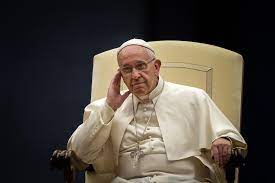Some Thoughts on Pope Francis’ Reply to the Dubia
Deacon D. McManaman
We’ve heard some negative press about Pope Francis’ responses to the recent Dubia. One person I know thought it was an instance of “giving scandal” and believed that now every wayward pastor and every same sex attracted couple will take it as an endorsement to continue in sin. I do not share these beliefs. What follows are some thoughts on why I believe such sentiments are not quite on point.
The responses to the Dubia are, I believe, rather brilliant. There is no doubt in my mind that the entire response is a “prudential matter”. It is also undeniable that wayward priests and anyone with questionable honesty will abuse what is written there and use it to justify many things that were not said therein. We know this from experience, i.e., the aftermath of Vatican II. The only difficulty with questioning prudential judgments is knowing what would happen if a different decision were made. For example, what would be the state of the Church had Vatican II not taken place? We simply don’t know–there are myriads of possibilities. What would have happened had the U.S not toppled Sadaam Hussein? Would he have finally achieved nuclear capacity? Very difficult questions that require tremendous learning. So it is a prudential matter, the application of principles to a concrete situation with innumerable factors to consider, and which require other intellectual virtues besides a knowledge of general principles, such as memory, docility, foresight, circumspection, caution, and shrewdness (Cf. Aquinas, S.T., II-II, q. 48). Memory requires experience, and the experiences we have are not universal, but are very much circumscribed. I am an experienced high school teacher; I am not and never have been a principal (administrator). Nor have I been a pastor of a parish, nor have I been a bishop of a diocese, nor an Archbishop, nor a Cardinal. And I certainly have no idea what it means to be a pope. That is why after a while, I stopped “second guessing” our school administrators’ decisions. I came to see that they have information that I don’t have. My friend became a vice-principal and a principal, and over the years he shared with me things that I otherwise would have missed. I only had the four walls of my classroom to deal with and the information that comes via that limited channel. That too is the reason that my friend, Major General JR Bernier (former Surgeon General of Canada and NATO) refused to “second guess” the medical advisors of the Ford government–because he lacks the situation/region specific political/economic/viral/medical etc., data that he would need to make such decisions, data that changes every day.
But here is my theological point. We are each given certain charisms to fulfill the duties of our vocation, and a bishop is given the charism of office. The Pope especially is given the charism of office (“Simon, Simon, Satan has asked to sift each of you like wheat. But I have prayed for you, Simon, that your faith will not fail. And when you have turned back, strengthen your brothers” Lk 22, 32). Not only does he see what we in our very limited situation do not see, but he has a charism that you and I do not possess, because we don’t need it–God has not called us to govern the universal Church. Your charisms and experience are specific to your unique vocation.
It is true that if we simplify everything to a “black and white” level, those at the very bottom of the intellectual and moral ladder will have clarity (whether or not they obey is another matter), but those higher up that ladder will see that things are just not that simple, because they understand that reality is very complex (as does Pope Francis), and so on their end, the Church will lack credibility as an institution capable of dealing intelligently in a highly complex world, and so the Church will lack relevance to a good portion of the world. So, it’s like squeezing a balloon. The problem just gets transferred from one level to another. But a decision has to be made. The decision must be grounded in the truth, and if the truth is complicated, so be it. What is the best decision to make in the circumstances? We have to know all the factors involved, which requires a great deal of experience, and we need that specific charism, because experience is still not enough. The Pope has that charism, I don’t. As for the Pope’s theological responses to the Dubia, they are, from an epistemological point of view, absolutely right on point. Is now the opportune time to introduce such distinctions? He seems to think so. We have to trust that the Lord has given him the charism to discern, that he is the vicar of Christ and that “he who hears you hears me” (Luke 10, 16).
